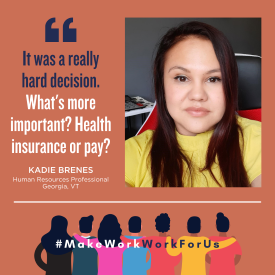 When the pandemic hit in March of 2020, Kadie was pregnant and finishing up her master’s degree. That summer, she was furloughed from her job in human resources. Her employer didn't provide a particular date for her to come back, and couldn’t guarantee that she could return to her job at all. However, they maintained her health insurance even though she wasn’t being paid, and committed to honor the maternity leave she’d earned as long as she didn’t get hired elsewhere. Kadie was faced with an impossible decision.
When the pandemic hit in March of 2020, Kadie was pregnant and finishing up her master’s degree. That summer, she was furloughed from her job in human resources. Her employer didn't provide a particular date for her to come back, and couldn’t guarantee that she could return to her job at all. However, they maintained her health insurance even though she wasn’t being paid, and committed to honor the maternity leave she’d earned as long as she didn’t get hired elsewhere. Kadie was faced with an impossible decision.
"They said we may call you, or not. The uncertainty and the added stress were the hardest in my case. If I'd found a new job I would have been making money for how many weeks before giving birth, and then what? It was a really hard decision. What's more important? Health insurance or pay?" She decided to stay.
Meanwhile, school started. Kadie was home with her children, trying to navigate online systems, making three meals a day, and doing her best to be present. Her oldest, Naomi, now lives in Costa Rica. Her son Dior and daughter Tianna were in middle school, and her youngest, Joy-annah, would be born that October. Kadie said it was extremely difficult to juggle it all. "A lot of us parents dropped that ball thinking the kids were doing the work, but found out two weeks later they weren't."
And she knew she wanted to support people who were also struggling. "I helped others look for jobs while I was furloughed – friends and community members – to get out of the same situation I was in. I said that it happened to me too. I asked, what do you want to do? Here are some resources. I did mock interviews, where I pretended I was the employer so they could prepare. I wanted to be useful during a challenging time, and I had an advantage because of my skills. It was a very grim time for a lot of people. And later, I had something to say about what I did during this time when employers asked. I utilized my knowledge to help others."
However, Kadie says that now is even more challenging than last year. As of February, she’s back working in her field. Her employer requires that she comes into the office twice a week, which makes it difficult to run pickup and drop off to the different schools her children attend. In fact, no busses are available in their town for Dior to get to St. Albans High School. Tianna can take the bus to middle school, but when she does after school activities like soccer, there isn’t a late bus option.
"I have flexibility most days to be able to pick them up, but what about hourly employees? And if you rely on public transportation – there's not consistent options."
Kadie would like to work with other parents to find a solution to all the driving, but she ran into another barrier. "I wanted to pay another parent $50/week to pick up my high schooler, but I couldn't write it off because deductions cut off at 13 years old. I can't pay a person pre-tax, because once my son turned 13, the IRS doesn't allow you to do that. The IRS could help, and take into consideration high schoolers.”
In addition to expanding pre-tax deductions for working families, there’s another thing Kadie would like to see to make work work for all of us: employers setting policy in advance to clearly state procedure in the case of downsizing. Will the organization keep people based on seniority? Experience? Performance? Kadie wants to see it spelled out.

